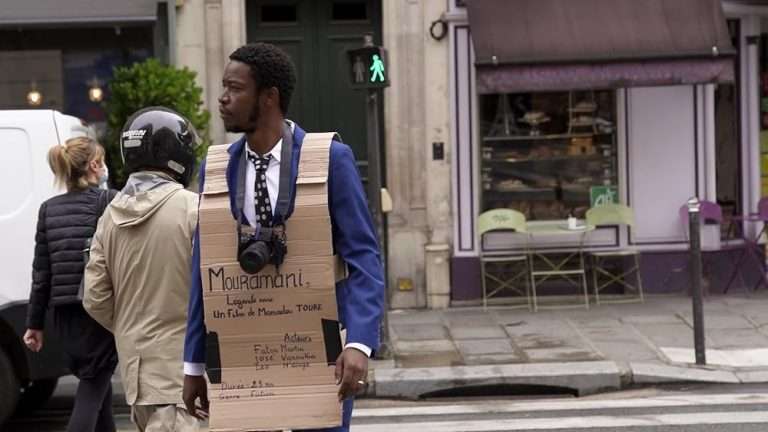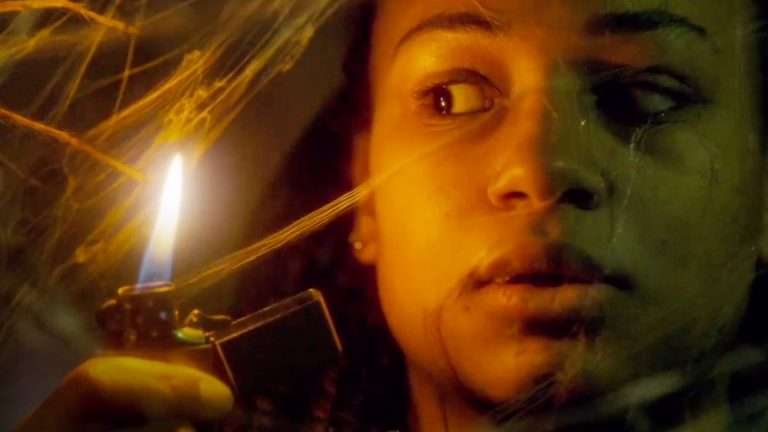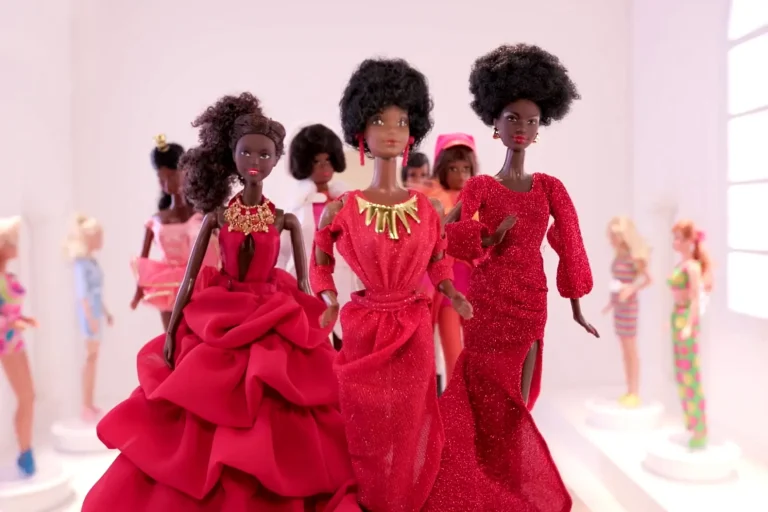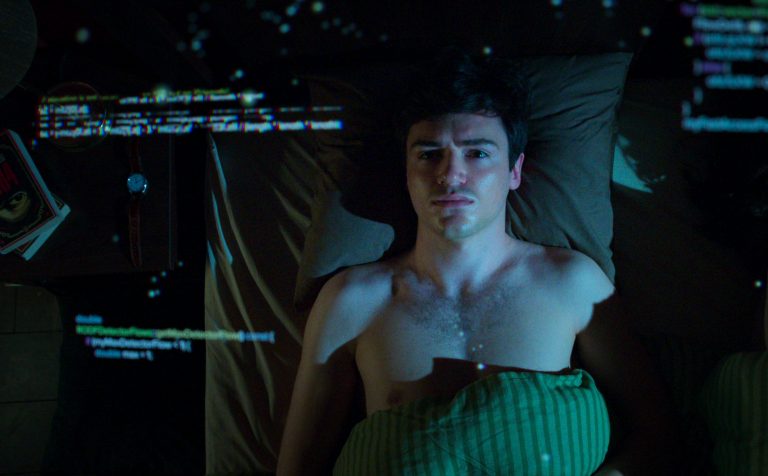“Darlings” is a beautifully-written film about Badrunissa and Hamza Sheikh, whose ‘love marriage’ becomes a cyclical series of beatings followed by apologies. The movie is not just about breaking that cycle, but also about the underlying generational trauma.
The stellar performances and the breathtakingly detailed production design bring the social implications in the script to visual fruition. The screenplay very subtly weaves in the breathing islamophobia that brews behind the police quarters, while also making us empathize with the women at the center better by placing them inside a minority within a minority. In this piece, we take a look at some of the film’s deeper themes while explaining its plot.
Why Does Badrunissa Kidnap Hamza?
“Darlings” starts with Badrunissa waiting near a cinema hall in Mumbai, presumably for her boyfriend. We hear Vishal Bhardwaj’s composition play in the background, beautifully setting up the conflicts and the contradictory tone we would later see in the film. After Hamza arrives late and apologizes to her, he tells her that he has landed a government job and now they can get married. We see Bandru’s face lit up, supposedly implying that she had wanted this for a long time. The movie then cuts to 3 years later- Hamza and Badru seem to be living a happily married life. Badru keeps asking him to talk to a builder, but he seems reluctant. While having dinner, he accidentally bites into a tiny stone in the rice. The camera starts panning in gradually, as the harmonious jolly music now begins to fade away, drawing us into what’s really happening. This brings a moment of silence, and Badrunissa brings her palm forward, signifying that he can spit that morsel in her hand. It’s routine; a tiny gesture, reminiscent of the patriarchal power imbalance of the household.
When Hamza bites into a stone again, he loses his patience, grabs Badru by the neck, and beats her. Hamza tries making up to Badrunissa every morning after inflicting physical trauma, but she resists. He lays on the charm that made her fall for him in the first place, and she melts. The pattern is hard to break. And yet, it doesn’t take long for us to realize that Hamza is a serial wife-beater; he doesn’t do it because he is forced into it, he does it because he likes it. It makes him feel like a big man in his own house, after being unmanned everywhere else as he’s unable to show his superiority in his workplace, where he is asked to clean rubbish (literally).
The next day, Hamza apologizes to Badru and sweet-talks her into believing how much he loves her. Badru reluctantly forgives him- we know it’s not the first time- and talks to him about having a baby as they had originally planned. But Hamza looks reluctant. The scene right here is indicative of why most women don’t recognize abuse when it happens, but the film never sends off that message wrong. The one remark a man does make regarding how men inflict abuse is because women let them, comes out of the mouth of a police officer. This is how the movie sets up its contradictions. Will Badru shed away this goodness inside of her and let the poison supersede the frog’s naive persona? How painful can this illusion of love get? We see how Badru keeps blaming her husband’s violent tendencies on his alcohol and tries to get him to eat medicine to cure him of the ‘affliction.’ But he finds that out too and beats her followed by some sweet talking the next day. We know she’s deeply seethed into this manipulative cycle of abuse at play.
One day, as things go too far, Badru admits to her mother, Shamshunissa, that previously, the wounds were only physical. But now, things are going too far. Zulfi, a man who lives around and sells second-hand household items to Badru’s mother, files a complaint on her behalf. Notice how Badrunissa (along with her Amma) gets instantly paranoid at the phone call her Amma receives from the police station as if she were being furtive while being the victim herself. These nuances that go on to become the defining characteristic of how society always finds ways to blame women for the actions of men, form the secret recipe for this dark comedy to work. In doing so, the biggest strength of “Darlings” remains how it never trivializes the oppression because it has such a well thought understanding of the ugly nature of domestic abuse.
Cutting back to the police station now, Badru, who is extremely disappointed in Hamza, decides to proceed with the complaint. But Hamza manipulates her again, as she goes to see him in the jail. He assures her saying how he has changed and is ready to have a child with her. Agreeing to quit drinking once their child comes into the world, he indirectly makes Badru refuse to file charges against him. But Shamshunissa warns her that violence is in his nature, and she must learn from her mother’s mistakes. Badru tells her that her and Shamshu’s lives are different because Hamza loves her and will not leave her. On their way back home, Hamza starts inquiring who filed the complaint against him but is met with silence. He annoys Shamshu, testing her patience, as she eventually tells him that a man who hits a woman is not a man. Drunk and infuriated, he punches Shamshu’s nose. The two women in the backseat are horrified, and Shamshu asks Badru to choose between her and her husband. Badru is terrified, not knowing what to do. Through a musical montage sequence, we see the couple embracing the pregnancy of Badru as they prepare for the baby.
“Darlings”- Technical Aspects Explained
The walls of the Sheikh household in “Darlings” are thin; the pink-and-blue color scheme of the rooms along with the feeling of the walls literally closing in on Badru add to the rich visual storytelling. The 29-year-old actress, who has been giving multiple hits this year, registers the mood without saying a word in multiple scenes that set up this repetition. The chemist hands her the Savlon bottle just by looking at her body language, the parlor lady very matter-of-factly shrugs every time there are evident loud noises of supposed domestic abuse coming from the ceiling. A pink teddy bear becomes a metaphor for the couple’s evolving relationship, while the song “Main Agar Kahoon” (about a woman rising from the dead to inflict revenge upon her husband) becomes a reoccurring presence.
How Do Badrunissa And Shamshunissa Hold Hamza Hostage?
In one scene, we saw a police inspector mention how the ‘Nissa’ in both the mother and daughter’s names is similar to ‘Nisha,’ which means darkness. This is an early reference and foreshadowing of what the duo is capable of carrying. Holding Hamza captive, because he had pushed Badru off a flight of stairs after inflicting physical violence on her, even after knowing her pregnant state, Badru blackmails him to sign the papers for the builder. She is done being manipulated by her husband- the breaking point was when she learned how she had lost her unborn daughter due to the fall. Even Zulfi is now included in the plan.
The tension, and also the means for the dark humor to sprout out in the movie’s second half now starts building when Hamza gets a call from his office for not showing up at work. His boss comes home, looking for him. Badru and Shamshu lie to him that Hamza has lost his life because of excessive drinking, and he made them lie about his whereabouts so that he could keep getting his salary.
As a precautionary step, the mother-daughter duo goes to the police station to file a missing complaint against Hamza. The officers, start assuming their own versions of what might’ve happened, leading to them believing that with the theory that Badru and Zulfi must have had an affair and killed Hamza. They go to Badru’s house and find Zulfi there. As they are searching around the place, Zulfi tells the pair of officers how he let Hamza go when he promised to return to his village and farm on his land. As the police tell Zulfi to confess whether he likes Badru or not, he gets frustrated and finally tells them that he likes Shamshu instead- leading to chemistry that the film had hinted at in some of the previous scenes.
Back at the station, Hamza is already present. He has made his way there, in a heavily medicated state. Badru thinks fast and manipulates the situation enough to take him back home. The time has come to get rid of Hamza.
“Darlings” Ending Explained: Does Badrunissa Kill Hamza?
Badrunissa makes Hamza record a video where he says that he will leave everything and go back to his village. Once the recording is done, Hamza is under the impression that he has bought his freedom and would finally go leave the place. But the twist in the tale is that Badru, after conspiring with her Amma, still plans on killing him. He is knocked out by the latter and taken to the railway tracks. As the train comes closer, Badru realizes that this is not the punishment that she wants to deliver. She says that she is different from Hamza and how killing him would make them alike. And hence, she saves him, just in the nick before the train arrives. It’s here when we realize what Badru meant when she told Shamshu how their lives are different as the movie reveals what truly happened between Shamshu and her husband. After many supposed events of abuse, she had taken his life away and disposed of his body in a similar fashion. By saving Hamza, she chose to break that cycle, visually implied through a stunning sequence where we see how Badru would never be able to get over what she did. Hamza begs Badru for a second chance, but she is just done with him. This infuriates Hamza, and he tells her that he will never let her go and even see to her end, just the way he saw the end of her unborn child. At that very moment, a train runs over him.
Everyone later believes that Hamza has committed suicide since Badru had recorded the video in such a way that it felt more like a suicide note. “Darlings” is ultimately about how women support each other through the labyrinth of patriarchal structures. But it’s also much more about the social conditions that nurture them, while also shedding light on where to draw the line between wrong and right. Following a scene in which the mother and daughter are looking in the mirror in their funeral attires, we see Badru realize that her father had never left her mother. She had killed him to protect herself from the violence he inflicted on her. The two women understood each other. They knew the options they had, they knew the consequences they would have to face, they accepted the choices they made and stood tall.
By the end of “Darlings”, Badru finds her footing in the world, coming out stronger than ever from the events that had preceded. The film ends in a similar way it begins, marking these two contrasts and bringing the structure a full circle. Badru goes to a cinema hall, but this time, she is not waiting for anyone. She is enjoying her own company, marking her journey to becoming a strong, independent woman who can take care of herself.
Final Thoughts
So many of the emotions in “Darlings” (and the source of entertainment for us) are purely born out of the reactionary situations, making it a perfect recipe for a dark comedy. And yet, just like an ideal film from the sub-genre, the script pierces its gloomy themes with a sheathing poignancy, reflecting them through the performances. By the end, the movie retains the integrity of both the famous parable (the frog and the scorpion) we grew up with, along with its protagonist.








